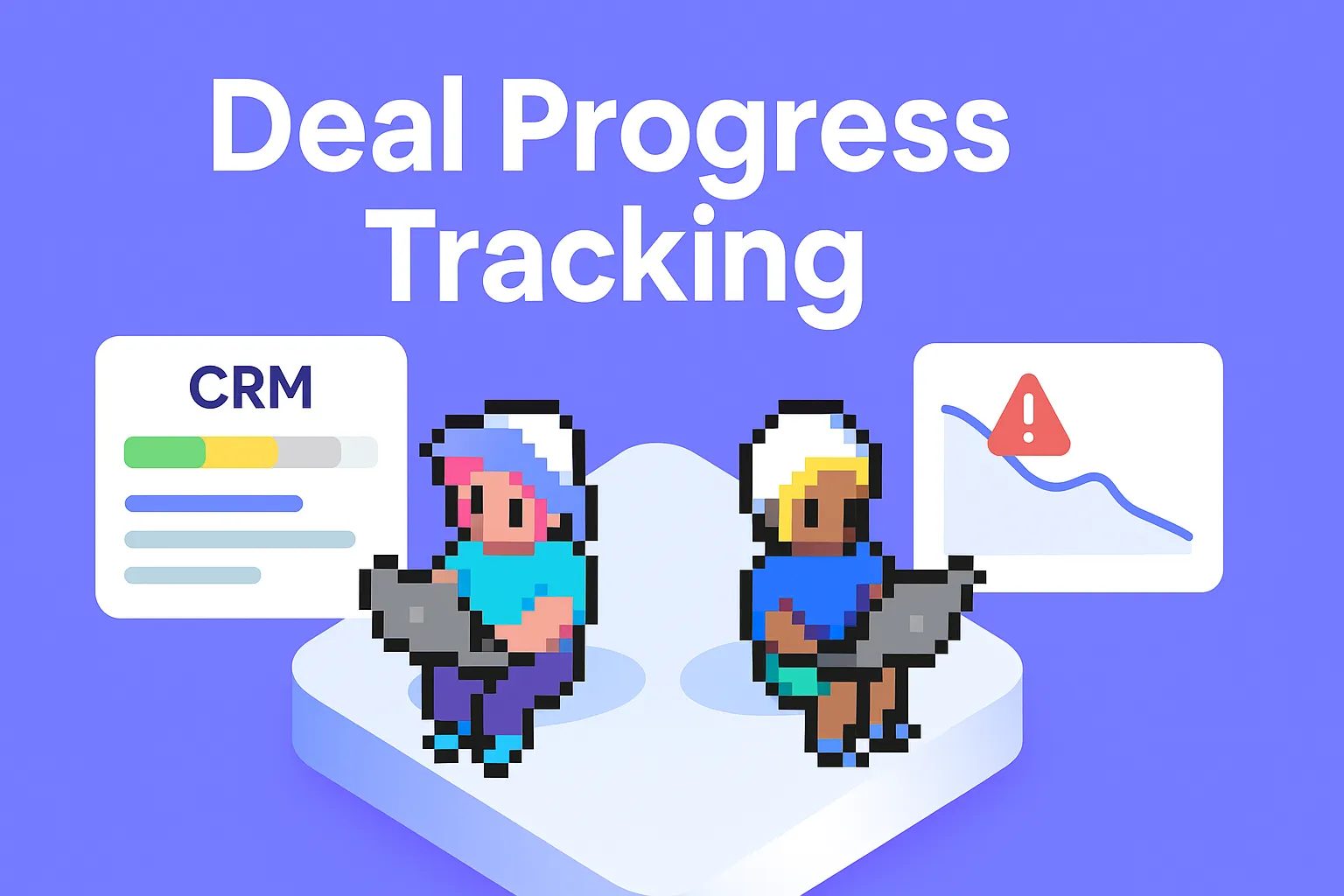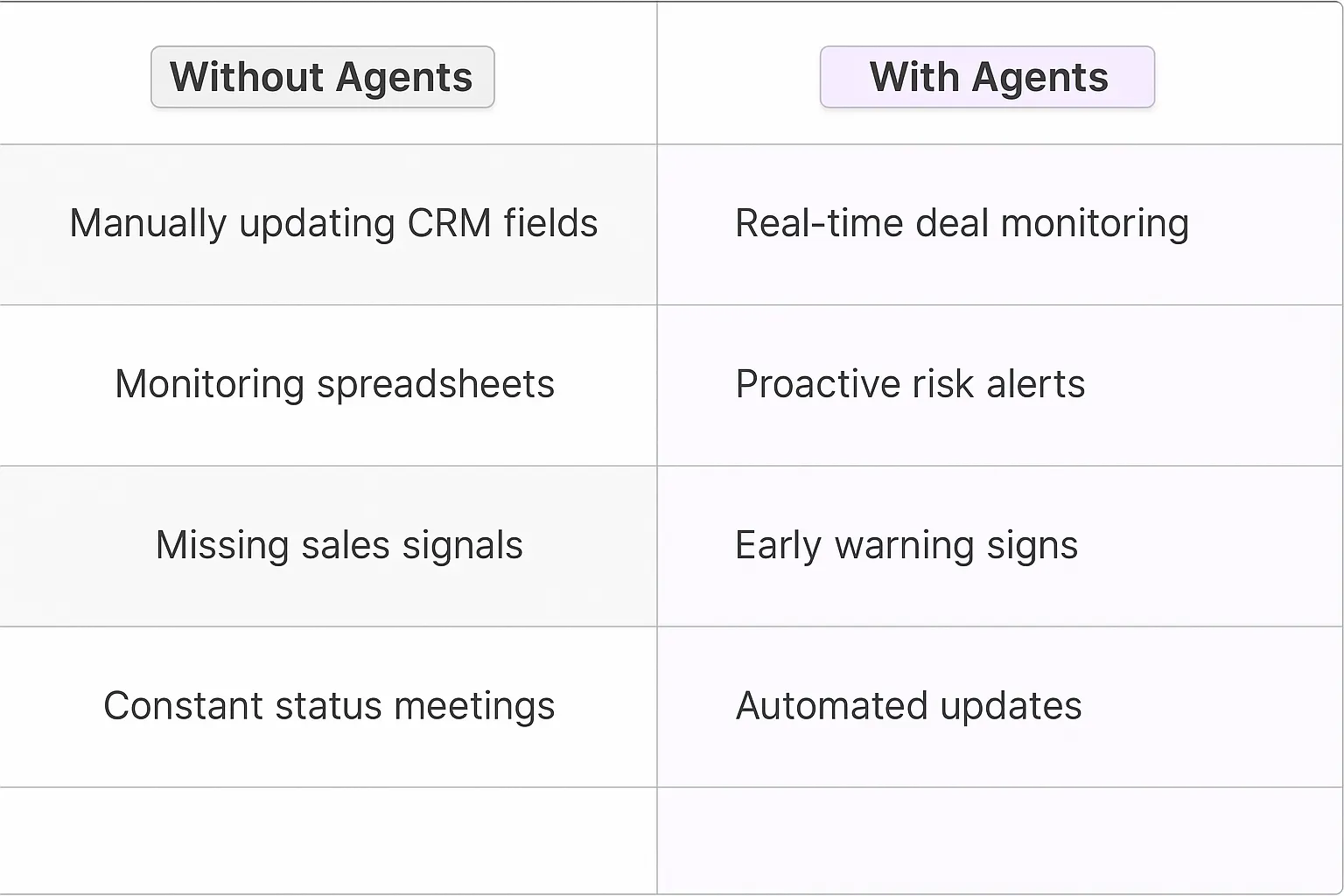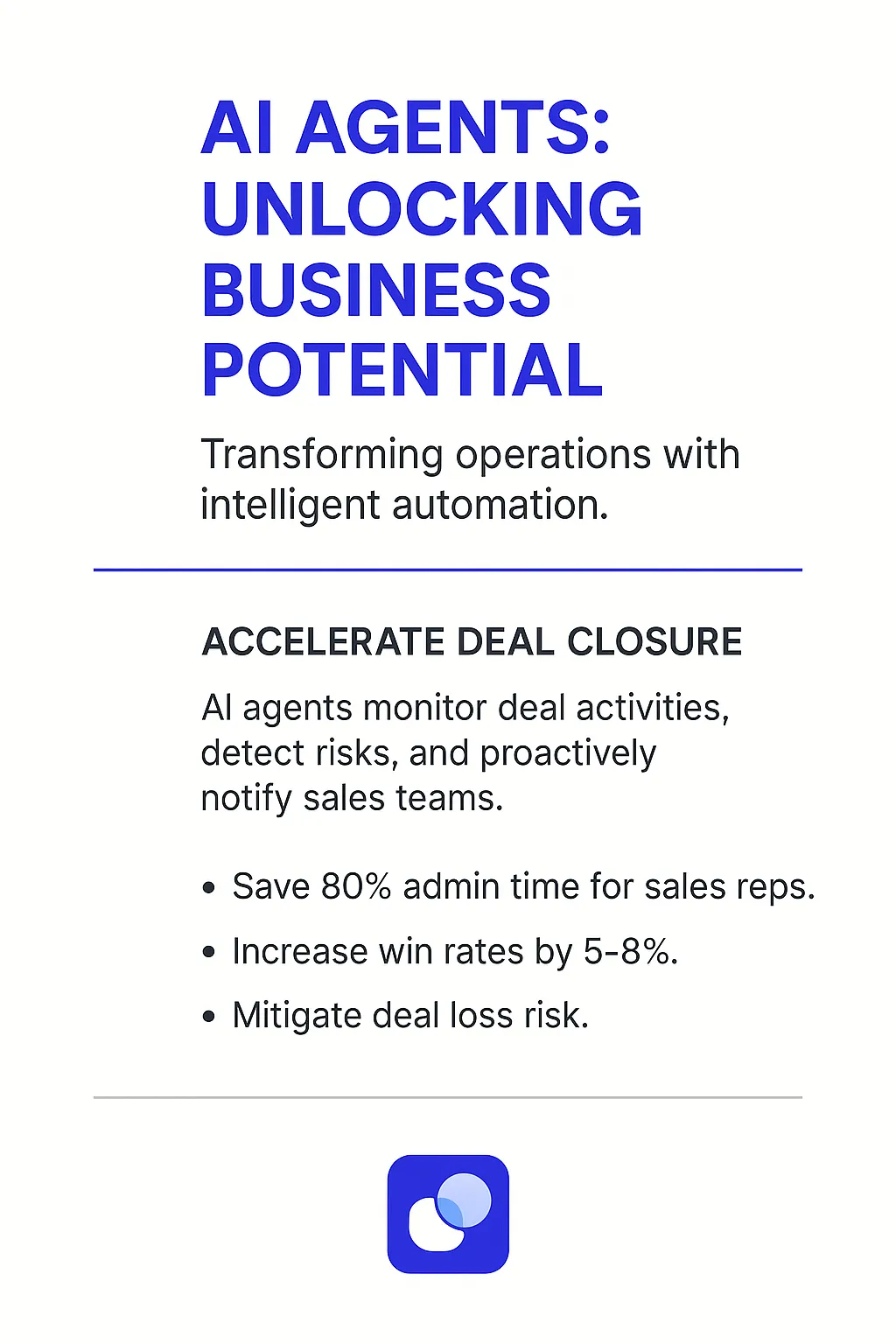Deal Progress Tracking AI Agents
Understanding Deal Progress Tracking Fundamentals
What is Deal Progress Tracking?
Deal Progress Tracking is a sophisticated approach to monitoring and managing business opportunities throughout their lifecycle. Unlike traditional CRM systems that simply log activities, this technology actively monitors deal health, engagement patterns, and momentum signals across multiple channels. The system creates a living, breathing picture of each opportunity's status and trajectory.
Key Features of Deal Progress Tracking
- Real-time monitoring of deal-related activities across platforms
- Pattern recognition for early risk detection
- Automated stakeholder updates and engagement tracking
- Predictive analytics for deal outcome probability
- Intelligent automation of routine follow-up tasks
- Cross-deal pattern analysis for strategic insights

Benefits of AI Agents for Deal Progress Tracking
What would have been used before AI Agents?
Sales teams traditionally relied on a mix of manual data entry, spreadsheet tracking, and constant back-and-forth communication to monitor deal progress. The reality was messy - sales reps spent hours updating CRM fields, sending status emails, and sitting through pipeline review meetings. They'd piece together deal momentum from scattered notes, email threads, and calendar invites. This manual approach led to data gaps, missed opportunities, and deals slipping through the cracks.
What are the benefits of AI Agents?
AI agents fundamentally transform how teams track and accelerate deals through the pipeline. These digital teammates continuously monitor deal-related activities across your tech stack, picking up on both explicit and implicit signals of deal health and momentum.
The game-changing element is their ability to proactively surface insights that would take hours of manual analysis to uncover. They'll flag when engagement patterns shift, when key stakeholders go dark, or when sentiment in email threads indicates growing deal risk. This early warning system helps reps course-correct before deals stall.
Beyond monitoring, these AI agents take autonomous action - scheduling follow-ups, enriching CRM records, and even drafting personalized outreach based on relationship context. They operate 24/7, ensuring no critical deal updates or customer signals are missed, even outside business hours.
The compound effect is significant: sales teams spend less time on deal admin and more time on high-value activities like relationship building. The enhanced visibility into deal progress leads to more accurate forecasting and faster deal cycles. Most importantly, it creates a systematic approach to deal tracking that scales across large sales organizations while maintaining that crucial personal touch in customer relationships.

Potential Use Cases of AI Agents with Deal Progress Tracking
Processes
- Real-time deal stage monitoring across multiple CRM platforms, giving sales teams instant visibility into pipeline movement
- Automated risk assessment by analyzing deal velocity and engagement patterns
- Custom deal progression alerts based on industry-specific sales cycles
- Integration with communication channels to track prospect interactions and sentiment
- Proactive identification of stalled deals through behavioral analysis
Tasks
- Generating detailed weekly deal progress reports with actionable insights
- Scheduling and tracking follow-up activities based on deal stage
- Monitoring document exchanges and signature status in real-time
- Analyzing historical deal data to predict closure probability
- Creating customized stakeholder updates based on role and involvement
The Growth Perspective on Deal Progress AI
The most interesting pattern I'm seeing in deal progress tracking is how AI agents are fundamentally changing the feedback loops in sales cycles. Traditional CRMs give you lagging indicators - they tell you what happened. But digital teammates focused on deal progress create leading indicators by analyzing patterns across thousands of deals in real-time.
What makes this particularly powerful is the network effect: each successful deal provides training data that makes the system smarter for future deals. The best sales leaders are using these AI agents not just for tracking, but for pattern recognition that humans simply can't match at scale.
The cold start problem gets solved through transfer learning - these systems can apply insights from similar deals across different industries. This creates a compounding advantage for organizations that adopt early and feed quality data into their systems.
For sales leaders, this shifts the focus from reactive management to proactive optimization. When your digital teammate can flag deals that are showing early warning signs based on hundreds of micro-signals, you can course-correct before deals actually stall.

Industry Use Cases
Deal progress tracking AI agents are fundamentally changing how teams manage their sales pipelines and business development efforts. The shift from static CRM entries to dynamic, intelligent deal monitoring creates a multiplier effect across organizations. Let me break down why this matters.
The versatility of AI agents in deal progress tracking makes them valuable across various industries. When I advise startups and growth teams, I consistently see how these digital teammates create network effects in deal management - each interaction makes the entire system smarter and more valuable for everyone involved.
What's particularly fascinating is how these AI agents have evolved from simple notification systems into sophisticated deal intelligence platforms. They're not just tracking data points; they're identifying patterns, predicting outcomes, and surfacing insights that would take teams weeks to uncover manually. This creates a compounding advantage for organizations that implement them early.
The real power comes from their ability to learn and adapt to industry-specific nuances. Whether it's SaaS companies tracking complex enterprise deals or real estate firms managing property transactions, these AI agents become increasingly attuned to the unique rhythms and signals of each sector.
Real Estate Deal Flow Management
Real estate brokerages face a unique challenge - tracking dozens of concurrent deals across multiple agents, each with their own timelines, documentation requirements, and stakeholder communications. I've seen countless brokerages struggle with this complexity, often relying on a mix of spreadsheets, emails, and mental notes.
A Deal Progress Tracking AI Agent transforms this chaos into clarity. The agent monitors each transaction's key milestones - from initial offer to closing - by analyzing email communications, calendar events, and document submissions. When inspection contingencies are approaching deadline, the agent proactively notifies the relevant team members. If mortgage approval documentation is missing, it flags the gap before it becomes a crisis.
What's particularly powerful is how the agent learns deal patterns over time. It starts recognizing which types of properties typically face longer inspection periods, which lenders move quickly on approvals, and which title companies need extra nudging. This pattern recognition allows it to provide increasingly accurate timeline predictions and risk assessments.
The real magic happens in the details - like automatically detecting when a buyer's proof of funds is outdated, or identifying potential red flags in property disclosure statements based on historical data. For a brokerage managing 50+ active deals, this level of oversight would typically require a full-time transaction coordinator. Instead, the AI agent handles these monitoring tasks 24/7, letting human agents focus on relationship building and deal strategy.
One brokerage I advised saw their deal fall-through rate drop by 23% within three months of implementing a deal tracking agent. The key wasn't just the tracking itself - it was the agent's ability to surface potential issues before they derailed deals. That's the difference between reactive and proactive deal management.
Venture Capital Deal Flow Intelligence
The venture capital landscape has a fascinating paradox - while we're investing in cutting-edge technology, many VCs still track their deal flow through a cobbled-together system of notes, emails, and gut feelings. I've spent years watching partners juggle hundreds of potential investments, often missing crucial signals or failing to follow up at the right moment.
A Deal Progress Tracking AI Agent fundamentally changes this dynamic. By analyzing email threads, calendar invites, pitch decks, and financial models, it creates a living map of each potential investment's journey. When a promising startup hasn't received follow-up after an initial meeting, the agent flags it. If market conditions shift for a specific sector, it correlates that data with active deals in the pipeline.
The agent's pattern recognition capabilities are particularly valuable in VC. It learns to identify subtle indicators of company progress - like changes in hiring patterns, product launch timelines, or engagement metrics. These insights help partners make more informed decisions about which opportunities deserve immediate attention.
What's fascinating is how the agent adapts to each firm's investment thesis. For example, if a firm historically succeeds with enterprise SaaS companies that hit $1M ARR within 18 months, the agent prioritizes similar patterns in the current deal flow. It's like having an analytical co-pilot that never forgets a detail or misses a pattern.
One VC firm I worked with discovered they were systematically passing on opportunities in developer tools because follow-ups were falling through the cracks during technical due diligence. After implementing a deal tracking agent, they caught these gaps and ended up leading two successful investments in the space. The agent didn't make the investment decisions - it just ensured the human partners had complete information at the right time.
Considerations & Challenges
Technical Challenges
Building effective deal progress tracking AI agents requires navigating several complex technical hurdles. Data integration across multiple systems poses a significant challenge - CRMs, email platforms, and document management systems often speak different languages. The AI needs to parse through unstructured data from various touchpoints while maintaining context about deal stages.
Real-time synchronization becomes particularly tricky when tracking multiple deals simultaneously. The AI must process incoming signals quickly enough to provide actionable updates, while avoiding false positives that could mislead sales teams. Machine learning models need constant refinement to recognize subtle indicators of deal progression or potential roadblocks.
Operational Challenges
Sales professionals often develop their own workflows and communication styles, making standardization difficult. The AI needs to adapt to different selling methodologies while maintaining consistent tracking metrics. Privacy concerns also emerge when dealing with sensitive client information - the AI must balance transparency with data protection requirements.
Change management presents another hurdle. Sales professionals may resist adopting new tools that feel intrusive or disruptive to their established processes. Training the AI to provide genuinely helpful insights rather than obvious observations requires significant investment in understanding sales psychology and deal dynamics.
Integration Requirements
Success depends heavily on seamless integration with existing tools. The AI needs clean APIs and reliable data streams from every platform involved in the sales process. Custom field mapping and regular maintenance become essential as organizations modify their tech stack or update their sales processes.
Building trust with users means delivering consistent accuracy in deal stage identification and progress assessment. False predictions or missed signals can quickly erode confidence in the system. Teams need clear visibility into how the AI makes its determinations to maintain trust in its recommendations.
Scaling Considerations
As deal volume grows, the AI must maintain performance without creating system bottlenecks. Resource allocation becomes critical - processing power needs to scale efficiently with increased usage. The system should handle multiple time zones, languages, and regional sales practices while maintaining accuracy across all scenarios.
Data storage requirements grow exponentially with deal history accumulation. Organizations need strategies for archiving and accessing historical data without compromising system performance. The AI must evolve alongside changing market conditions and new sales methodologies.
AI-Driven Pipeline Management: The Future of Sales Intelligence
The integration of AI agents into deal progress tracking marks a fundamental shift in how organizations approach pipeline management. The network effects created by these systems generate an ever-widening competitive moat - organizations that adopt early gain compounding advantages through accumulated learning and optimization. The key insight isn't just about automation; it's about creating intelligent feedback loops that make entire sales organizations smarter over time.
Looking ahead, the organizations that will win are those that view these AI agents not as mere tracking tools, but as strategic assets that can reshape their entire approach to deal management. The future belongs to teams that can effectively combine human relationship-building skills with AI-driven pattern recognition and proactive deal intelligence.












